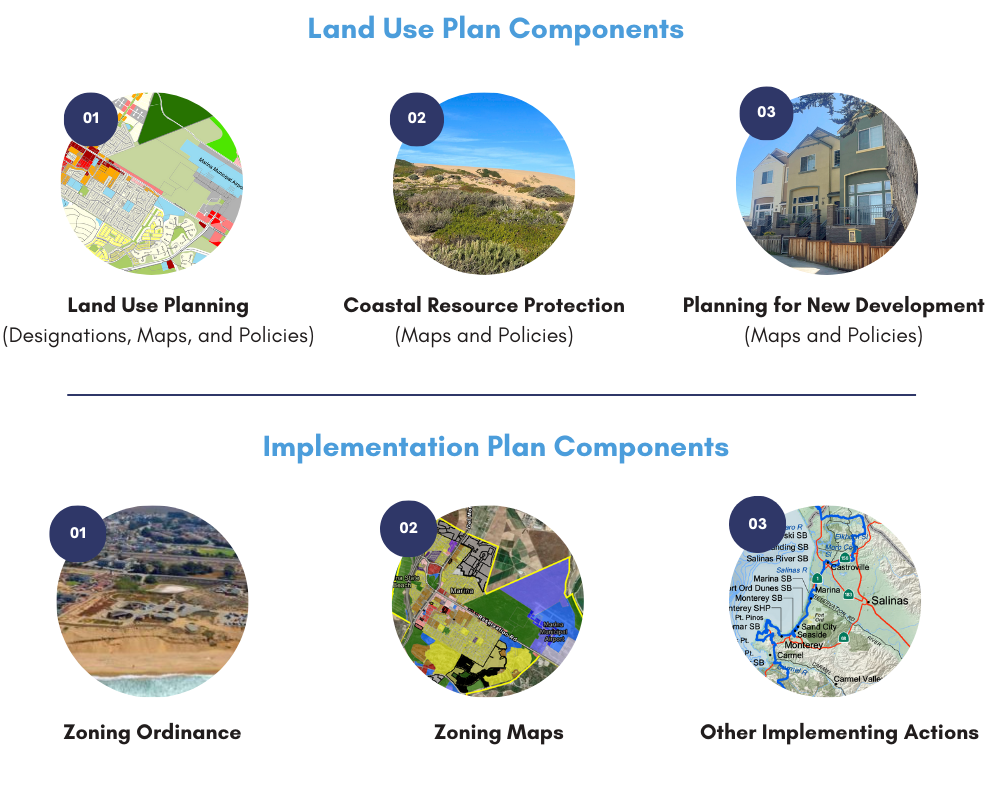Local Coastal Program Resources
What is a Local Coastal Program?
The Coastal Act requires that local governments develop Local Coastal Programs (LCPs) that can carry out policies of the California Coastal Act at the local level. LCPs are land use planning documents that lay out a framework for development and coastal resource protection within a city or county’s coastal zone area. They are prepared by the local jurisdiction and submitted to the Coastal Commission for certification.
Each LCP includes a Land Use Plan (LUP) which contains policies, and an Implementation Plan (IP) which includes accompanying measures to implement the plan (such as zoning ordinances, zoning district maps, and other implementing actions). LCPs specify the appropriate kinds, location, and intensity of uses of land and water in the coastal zone portion of a local government’s jurisdiction.
LCP Structure

More Information
The California Coastal Act of 1976 (Coastal Act), which became effective January 1, 1977, is the primary law that governs decisions of the Coastal Commission. The Coastal Act defines the Commission’s coastal management goals and policies, establishes the boundaries of the Coastal Zone, and creates governmental mechanisms for carrying out the state’s coastal management program. The Coastal Act is codified under Division 20 of the California Public Resources Code in Sections PRC §§30000 -30900.
The Coastal Act is a land use planning law that applies a specific set of land use planning principles and resource protection provisions within the Coastal Zone. The Coastal Act includes specific policies that address issues such as: development, design, zoning, shoreline public access and recreation, lower-cost visitor accommodations, terrestrial and marine habitat protection, visual resources, landform alteration, agricultural lands, commercial fisheries, industrial uses, water quality, offshore oil and gas development, transportation, power plants, ports, and public works. The policies of the Coastal Act constitute the statutory standards applied to planning and regulatory decisions made by the Commission and by local governments, pursuant to the Coastal Act.
There are 76 local government jurisdictions (15 counties and 61 cities) located entirely or partly within the coastal zone. Each jurisdiction is located in one of the following six coastal zone re gions as designated by the Coastal Commission: North Coast, North Central Coast, Central Coast, South Central Coast, South Coast, and San Diego.

Local governments play an essential role in coastal management, as partner agencies with a shared stewardship responsibility to protect and enhance coastal resources. Once certified by the Coastal Commission as consistent with and adequate to carry out the Coastal Act, responsibility for issuance of most Coastal Development Permits (CDPs) under the certified LCP is delegated to the local government. The Commission retains continuing permit authority over development on tidelands, submerged lands, and public trust lands, and appeal jurisdiction over certain types of development (as specified in Coastal Act section 30603(a)).
The Commission also has the responsibility to assist with and monitor the local government’s implementation of its LCP, and to certify amendments to the LCP that are consistent with Coastal Act policies and procedures. It is important to recognize and understand the regulatory roles and responsibilities of the local government and Coastal Commission following LCP certification.
Primary Role: Implementing its LCP through processing of coastal permit applications.
Other Regulatory roles:
- Reviewing coastal permit applications within certified areas, including hearing and noticing requirements.
- Reviewing new development for preliminary coastal permit approvals for areas that the Coastal Commission retains direct permit authority.
- Processing local appeals, implementing final local action noticing procedures, and transmitting the record for any appeals taken up at the Coastal Commission.
- Enforcing permit requirements and responding to violations.
- Recording legal documents related to open space, conservation, and public access in coordination with the Coastal Commission staff per Section 13574 of the Commission’s regulations.
- Implementing the LCPs public access component and coordinating with federal, state, and local agencies related to acquisition, development, and maintenance of public access within its jurisdiction to ensure efficient use of limited fiscal resources and provide an integrated system of public accessways to and along the state’s coastline.
- Processing amendments at the local level for any modifications or updates to the certified LCP.
- Coordinating and collaborating with Coastal Commission staff regarding all of the above roles, including questions of jurisdiction and process
Primary Role: Monitoring LCP Implementation and assisting local governments in carrying out their permit review and processing.
Ongoing Regulatory Roles:
- Reviewing coastal permit applications located within retained permit jurisdiction areas, including state tidelands, submerged lands, public trust lands, and uncertified geographic areas.
- Tracking and monitoring the local government’s implementation of the LCP and assisting where feasible.
- Tracking and noticing appeal periods for local appealable coastal permits.
- Processing appeals of local development at the Coastal Commission.
- Enforcing Coastal Commission permits it issued before LCP certification or from an appeal, and reviewing amendments or extensions of such permits.
- Ensuring legal documents related to open space, conservation, and public access are processed and recorded pursuant to Section 13574 of the Commission’s regulations.
- Implementing the Coastal Commission’s public access program and coordinating with federal, state, and local agencies related to acquisition, development, and maintenance of public access within its jurisdiction to ensure efficient use of limited fiscal resources and provide an integrated system of public accessways to and along the state’s coastline.
- Reviewing the local government’s proposed LCP amendments through the Commission’s amendment process.
- Reviews certain federal activities or federally licensed or permitted projects for consistency with the state’s coastal management program under provisions of the federal Coastal Zone Management Act.
- Coordinating and collaborating with local government staff regarding all of the above roles, including questions of jurisdiction and process and making jurisdictional determinations in cases where a local determination is questioned or challenged.
Additionally, Coastal Act Section 30519.5 requires the Commission to review each certified LCP at least once every five years after certification to determine if it is being implemented consistent with the policies of the Coastal Act. However, due to staffing and funding constraints, the Commission has not been able to fulfill this requirement.
Keep up to Date
Stay updated on the latest news regarding the Local Coastal Program update by joining our mailing list.

